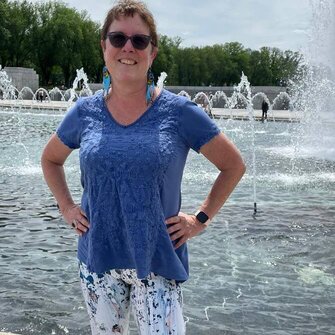
The day I visited Shadya Abu Awad, 25, from the Beach Refugee Camp in Gaza’s village of al-Shati, it took a while for her to convince her four kids, various relatives and sundry neighbors to take their play and chatter to the street so we could have a quiet conversation.
To reach her home, I had crossed what seemed like a labyrinth of narrow roads, crossed an alley facing a line draped with clothes of many sizes and hues and a cement wall of graffiti. The bare cement stairs to her living quarters have no railing.
On the second and last floor of a building owned by her in-laws, Shadya cares for her three sons and a daughter: 15, 12, 10 and 3 years old. She’s been a single parent for the past 14 months since her husband was imprisoned, a private pain she prefers not to talk about but weighs heavily in the droop of her shoulders.
Inside, there were just two doors, at the entrance and to the bathroom. A kitchen with a few shelves was on the left and on the right, a room filled with pillows, mattresses and blankets for winter. The rooms were clean but gray in their look and feel. We moved into a small space for guests and sat on a bright red mattress on the floor. The mattress, along with a line of blue-and-white vases (but no flowers) on a wall shelf, gave the room a touch of color.
“I depend on charity from the government, which gives us a coupon for food every three months, and on nice people like you,” Shadya answered when I wondered how she and her children support themselves.
I am a writer for We Are Not Numbers, but that day I had come on behalf of Gaza’s Youth Vision Society and the American NGO Rebuilding Alliance. “Together we build, together we change” is the motto and mission of the youth society, which was formed in 2009 is to support marginalized residents like Shadya. It operates through four primary programs: capacity building, women’s and youth empowerment, and child protection. Its tools are awareness-building, advocacy, humanitarian aid and financial support.
In 2010, Shadya’s children enrolled in Youth Vision’s remedial classes that help students who lag behind their grade level. Shadya’s daughter, Lamees, who struggled with Arabic, science and math, saw her marks improve from 6 to 10 (with 10 being the highest possible). Youth Vision lso takes the children on excursions to provide a bit of stress relief and childhood time for kids.
Youth power

In addition to offering educational support, Youth Vision works with teens and young adults to nurture a spirit of responsible citizenship, help them secure employment, teach them how to budget their scarce resources and develop entrepreneurship skills among those with ideas that could be developed into businesses. In 2017, for example, a group of girls age 14-18 launched an initiative they called “I have the right to play.” Its goal is to introduce girls to sport such as football (soccer) and cycling. In Gaza, the conservative social norms typically prevent girls from practicing sports publicly; this program aims to change that and promote gender equality overall.
Super ‘she power’
Without empowered women supported by adequate resources, children and the family unit as a whole can’t thrive. That’s why Youth Vision also offers support for parents—particularly mothers.
Shadya said she especially benefited from workshops on first aid and women’s rights. “If one of my kids is exposed to an electric current, I know now how to react,” she explained. “I told my sisters and neighbors about the lectures, so we could attend them together. A larger number of people here need to take advantage of them.”
Belal Al-Shaer, general manager of Youth Vision, explained to me that the NGO seeks to help women like Shadya “better integrate into the labor market and assume a role that is more equal to men in society.”
Thus, for instance, a primary focus is women’s participation in the social and economic system so they can serve as decision makers.
“We walk the talk,” Belal says proudly. “Female representation on our board of directors is 50 percent.”
Emergency aid
Youth Vision is aware that some practical needs of everyday life are urgent and must be addressed before education and empowerment. For example, Shadya’s family was one of 60 to receive a new toilet.
“My toilet was useless and not suitable for human use. Before, all we had was a squat toilet in the floor. Sometimes, I went to my mother-in-law’s bathroom,” Shadya explained.
Another such service offered by Youth Vision is distribution of portable solar lights, donated by Rebuilding Alliance. The typical home in Gaza receives only four hours of electricity a day, making it difficult for children and youth to study and parents to cook and wash clothes. Beach Camp is one of three neighborhoods to receive the solar lights to reduce the dangerous use of candles, which can cause fires. The LED lamps are charged using sunlight.
“You don’t know how much you depend on light until you don’t have it,” observed Shadya. “The solar lamp has given me back some control over my life.”











